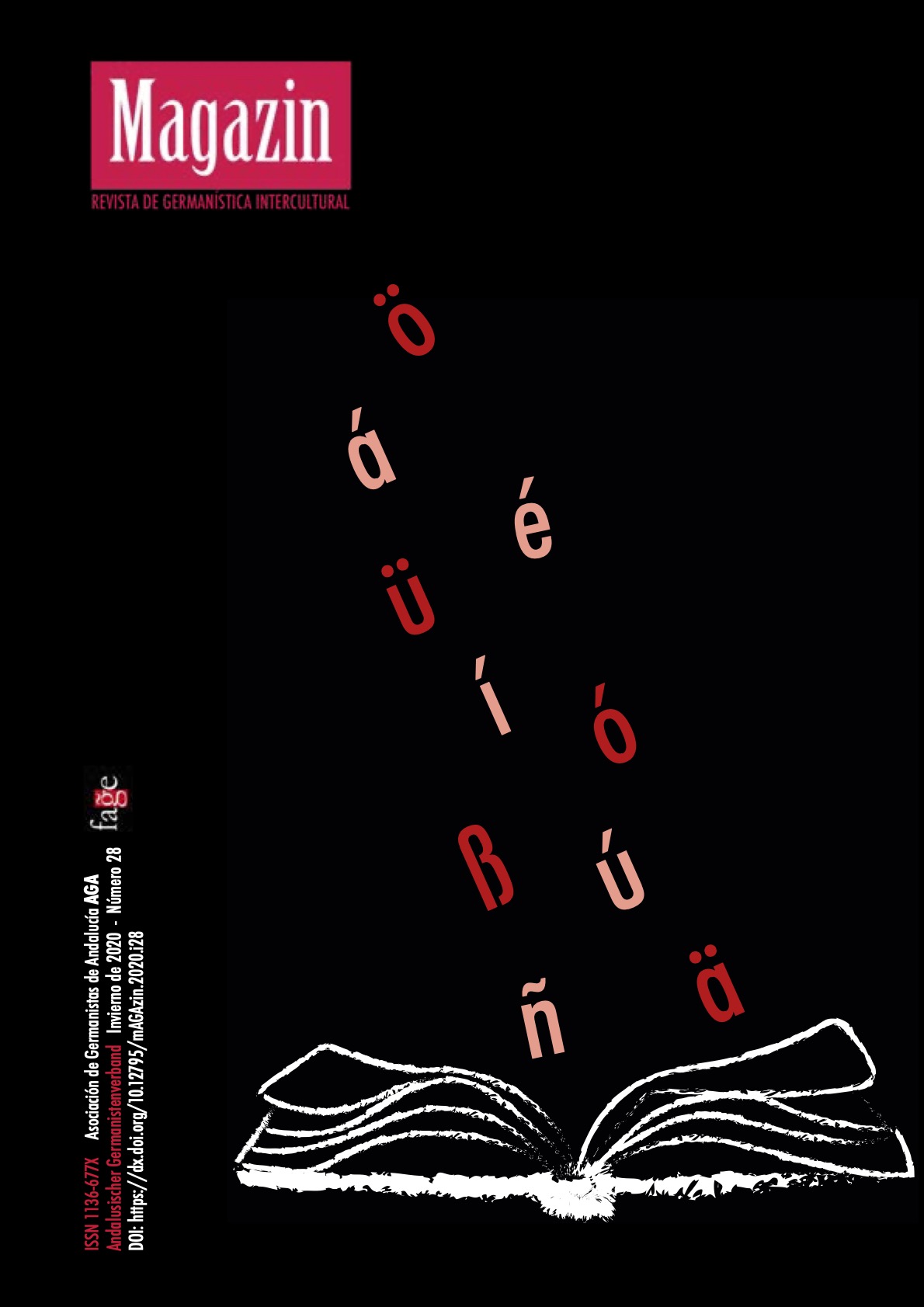Selbstwahrnehmung Lehrender mit Deutsch L1 oder LX hinsichtlich ihres Verhaltens im DaF-Unterricht
DOI:
https://doi.org/10.12795/mAGAzin.2020.i28.02Palabras clave:
Deutsch als Fremdsprache, Muttersprachler*innen, Lehrer*innen, Erstsprache, SelbstbildResumen
In der Fremdsprachendidaktik war man lange der Ansicht, dass native speakers im Vergleich zu ihren nichtmuttersprachlichen Kollegen kompetentere Sprachlehrende sind. Allerdings setzt sich die Lehr-Lern-Forschung mit genau dieser Diskussion erst seit den 1990er Jahren auseinander, und fast nur im EFL/ESL-Bereich. In diesen ersten Studien zeigte sich eine Dichotomie zwischen native und non-native speakers, nach der die zwei «Gruppen» ihren persönlichen Einschätzungen zufolge anders unterrichteten (Medgyes 1994).Der vorliegende Beitrag untersucht die Selbstwahrnehmung von DaF-Lehrer*innen mit Deutsch L1 und LX hinsichtlich ihres Verhaltens im Unterricht, um herauszufinden, ob diese in verschiedenen Studien dargestellte Dichotomie ebenfalls im DaF-Bereich auftritt. 60 Lehrkräfte verschiedener Universitäten und Goethe-Institute in Spanien und Portugal haben an einer Umfrage teilgenommen, deren Auswertung die Ergebnisse anderer Studien der EFL/ESL-Didaktik teilweise bestätigt, allerdings nur als mögliche Tendenzen oder Präferenzen. In den meisten Fällen zeigen die Befragten abgesehen von ihrer Erstsprache nur sehr wenige Unterschiede.
Descargas
Citas
Amin, N. (1997). Race and the identity of the non-native ESL teacher. TESOL Quarterly, 31, 580-583. https://doi.org/10.2307/3587841
Árva, V. & Medgyes, P. (2000). Native and non-native teachers in the classroom. Sy-stem,28, 355-372. https://doi.org/10.1016/S0346-251X(00)00017-8
Auswärtiges Amt (2020). Deutsch als Fremdsprache weltweit. Datenerhebung 2020 (2. Auflage). Bonifatius.
Benke, E. & Medgyes, P. (2005). Differences in teaching behaviour between native and non-native speaker teachers: As seen by the learners. In E. LLurda (Ed.), Non-native language teachers. Perceptions, challenges and contributions to the profession. Springer.Bloomfield, L. (1984 [1933]).Language. Neudruck. University of Chicago Press.
Borg, S. (2006): The distinctive characteristics of foreign language teachers. Language teaching research, 10(1), 3-31. https://doi.org/10.1191/1362168806lr182oa
Braine, G. (2010). Nonnative speaker English teachers. Research, pedagogy, and professional growth. Routledge. https://doi.org/10.1093/applin/amr028
Bundesamt für Migration und Flüchtlinge: AusländischemStaatsangehörige, https://www.bamf.de/DE/Themen/Integration/TraegerLehrFachkraefte/TraegerIntegrationskurse/Organisatorisches/TeilnahmeKosten/Auslaender/auslaender.html?nn=282656, letzter Zugriff: 15.11.2020.
Carson, L. (2010). Innovation and autonomy in an institution-wide language program. In L. Carson & B. O. Rourke (Eds.), Language learner autonomy: Policy, curriculum, classroom (S. 151-167). Peter Lang.
Deutsche Auslandschulen (DAS): https://www.auslandsschulwesen.de/Webs/ZfA/DE/Schulnetz/DAS/das_node.html, letzter Zugriff: 24.09.2019.
Dörnyei, Z. (2005). The psychology of the language learner: Individual differenc-es in second language acquisition. Law-rence Erlbaum Associates. https://doi.org/10.4324/9781410613349
Duden (2019): Muttersprache. Duden online, https://www.duden.de/rechtschreibung/Muttersprache
Eidgenössisches Departement für auswärtige Angelegenheiten EDA: https://www.eda.admin.ch/eda/de/home/leben-im-ausland/die-fuenfte-schweiz/schweizerschulen-im-ausland.html, letzter Zugriff: 28.01.2021 Goethe-Institut: Standorte, www.goethe.de/de/wwt.html, letzter Zugriff: 24.09.2019
García Merino, I. (1997). Native English-speaking teachers versus non-native English-speaking teachers. Revista alicantina de estudios ingleses, 10, 69-79. https://doi.org/10.14198/raei.1997.10.07
Ghanem, C. (2014). Teaching in the foreign language classroom: How being a native or non-native speaker of German influences culture teaching. Language tea-ching research, 19(2), 169-186. https://doi.org/10.1177/1362168814541751
Hinkel R. (2001). Sind „native speaker“ wirklich die besseren Fremdsprachenlehrer? Fremd-perspektive in DaF-Unterricht und Auslandsgermanistik. Info DaF, 28(6), 585-599. https://doi.org/10.1515/infodaf-2001-0604
Holec, H. (1980). Learner-centred communicative language teaching: Needs analysis revisited. Studies in Second Language Acquisition, 3(1), 26-33. https://doi.org/10.1017/S0272263100000176
Johnson, K. & Johnson, H. (Eds.) (1998).Encyclopedic dictionary of applied linguistics. Blackwell.
Kamhi Stein, L. (2000). Adapting U.S.-based TESOL teacher education to meet the needs of nonnative English speakers. TESOL Journal, 9(3), 10-14.
Kiczkowiak, M. & Wu, A. (2018).Discrimination and discriminatory practices against NNESTs. The TESOL Encyclopedia of English language teaching, https://doi.org/10.1002/9781118784235.eelt0014
Kramsch, C. (1997). The privilege of the non-native speaker. PMLA, 112, 359-369. https://doi.org/10.1632/S0030812900060673
Liehr, H. (1994). Muttersprachler als Sprachlehrer: Chancen und Risiken. Die Unterrichtspraxis / Teaching German, 27(2), 43-49. https://doi.org/10.2307/3530986
Llurda, E. (Ed.) (2005).Non-native language teachers: Perceptions, challenges, and contributions to the profession. Springer.
Llurda, E. (2018). Methods in non-native English. Speaker teacher research. The TESOL Encyclopedia of English Language Teaching, https://doi.org/10.1002/9781118784235.eelt0032
Llurda, E. & A. Huguet (2003). Self-awareness in NNS EFL primary and secondary school teachers. Language awareness13, 220–235. https://doi.org/10.1080/09658410308667078
Mahboob, A., Uhrig, K., Newman, K., & Hartford, B. (2004). Children of a lesser English: Nonnative English speakers as ESL teachers in English language programs in the United States. In L. D. Kamhi-Stein (Ed.), Learning and teaching from experience: Perspectives on nonnative English-speaking professionals (S. 100-120). University of Michigan Press.
Medgyes, P. (1992). Native or non-native: Who’s worth more?. ELT Journal, 46, 340-349. https://doi.org/10.1093/elt/46.4.340
Medgyes, P. (1994).The non-native teacher. Macmillan.
Medgyes, P. (2001). When the teacher is a non-native speaker. In M. Celce-Murcia (Ed.), Teaching English as a second or foreign language (S. 429-442). Heinle & Heinle
Moussu, L. (2006).Native and non-native English-speaking English as a second language teachers: Student attitudes, teacher self-perceptions, and intensive English program administrator beliefs and practices. Purdue University. http://dx.doi.org/10.1017/S0261444808005028
Moussu, L., Llurda, E. (2008). Non-native English-speaking English language teachers: History and research. Language Teaching, 41(3), 315–348.
Österreich-Institut:https://www.oesterreichinstitut.at/ueber-uns/, letzter Zugriff: 29.01.2021
Paikeday, T. M. (1985).The native speaker is dead! Paikeday Publishing.
PASCH-net: www.pasch-net.de, letzter Zugriff: 24.09.2019.
Reves, T. & Medgyes, P. (1994). The non-native English speaking EFL/ESL teacher’s self-image: An international survey. System, 22(3), 353-367. https://doi.org/10.1016/0346-251X(94)90021-3
Riordan, E. (2018). Language for teaching purposes. Bilingual classroom discourse and the non-native speaker language teacher. Palgrave Machmillan. https://doi.org/10.1007/978-3-319-71005-1_1
Stern, H. H. (1983). Fundamental concepts of language teaching. Oxford University Press.
Yazan, B. (2018). Identity and NNESTs. The TESOL encyclopedia of English language teaching, https://doi.org/10.1002/9781118784235.eelt0020
Publicado
Cómo citar
Número
Sección
Licencia
Política de autoarchivo
Romeo Blue Journal (en preparación)
Solo se puede archivar el PDF de editor
El autor no puede archivar la versión pre-print
El autor no puede archivar la versión post-sprint
Condiciones generales
La revista se aloja en repositorios de acceso abierto
La revista se edita en formato impreso bajo demanda y para fines promocionales y de depósito legal en un porcentaje inferior al 5%
No prevé moving wall o período de embargo
Debe utilizarse la versión de editor/PDF
La fuente editorial debe reconocerse
Creative Commons Reconocimiento-NoComercial-SinObraDerivada 4.0 Internacional





